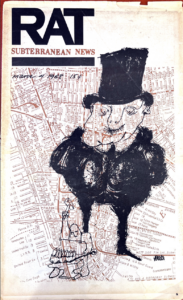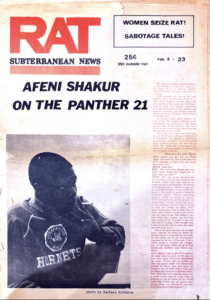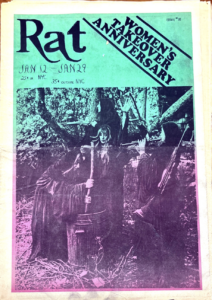by Jen
My final project asks: is the work of indexing and coding a text for analysis a reductive act, or can it be an act of care?
I bring to this work a perspective of the type of indexing that is typically done in libraries. This tends to focus on what a text is about; sometimes it will focus on who a text is by. Both of these feel reductive to me because determining “aboutness” is always a struggle and always requires focusing on some aspects more than others; I believe that some types of “aboutness” are always overlooked. A focus on authorship of a text is problematic because it complies with capitalist notions of authorship that celebrate specific types of contributions and that codify authorship in order to preserve economic benefit.
I have been working with a large number of newspapers from the radical Left in the 1960s and 1970s for my research. One of these, RAT Subterranean News, is notable because it changed halfway through its (3 year) lifespan after being taken over by a group of women. I have been curious about the different ways we can describe the impact these women had on the paper, but also, felt that a lens of subject analysis of the paper was not entirely helpful; when I took a quick pass at that work, I felt like I was boiling down the women’s contribution to “more articles about women,” but wondered how I could show that they are doing more than just elevating a content subject area that wasn’t there before.



I was deeply compelled by the recently released Letterpress Revolution, which explores the work being done specifically by anarchist newspapers. The author Kathy Ferguson created a set of types of work being done by different pieces of content in an anarchist newspaper: sharing news, creating public space, encouraging debate, etc. Her framework feels very applicable to me on a broader scale, outside anarchist publications.
Using that framework, I have started analyzing approximately 70 issues of RAT, from the first until (I think) the last. I am indexing each piece of content in the newspaper using Kathy Ferguson’s framework. My goal is to finish organize that analysis and then find a meaningful way to present that data that reveals some of the nuance that I think is missing in a subject-level analysis, and to depict what was being done by the women who took over RAT. How did their takeover of the newspaper transform that work that this publication was doing? Can we perhaps see that they imagined and realized greater possibilities for newspapers on the radical left? And ultimately, can this kind of analysis feel like it’s showing nuance and illuminating overlooked work, rather than feeling reductive?
The shape of my final project still feels a little murky. I’m not a whiz at data visualization, but will work on finding a way to share my findings visually. I imagine this would also be accompanied by a narrative providing context for my work and for the work of indexing this type of publication, as well as a textual interpretation of my results.




Jen,
Two things: 1) Librarians rock! 2) This is my favorite sentence: Both of these feel reductive to me because determining “aboutness” is always a struggle and always requires focusing on some aspects more than others; I believe that some types of “aboutness” are always overlooked.
I look forward to your project. I think this will be a wonderful resourse in a rhetorics course! From a rhetorics perspective, removing the about to define purpose is more valuable to understand the impact of these voices and these women and what it means for a movement.
As for platform, the two that pop into my head that might work are Omeka and ArcGIS StoryMaps (you don’t need a map).
Jen, we’ve talked about your project together a bit and I just want to say again that it’s such an interesting approach. I was thinking about it today while re-listening to the podcast with Patricia Matthew and Nina Banks—that even if we don’t want everything we do to be (say) monetized within a capitalist system, it is still important to identify it, count it, label it in ways that the system associates with value. This is a somewhat different question but I think the same principle applies—that even though some acts may feel reductive, they’re often a step within a necessary-but-not-sufficient movement toward visibility.